
Becoming a successful bettor requires not only a deep understanding of odds calculation but, it is also necessary to understand how the market works and especially how the bookmakers operate.
Of course, bookmakers are in the business of setting odds and determining prices which are offered for certain betting events.
 If I had to use just one word to describe how bookmakers think…
If I had to use just one word to describe how bookmakers think…Image: Cartoonresource (Shutterstock)
When viewing odds in betting exchanges such as Betfair, Betdaq, Smarkets, or WBX, you should understand that it is neither the exchange platform or the traders using them who set the odds.
The fact is that the bookmakers are used as the market guide for traders on the betting exchanges, and it is the bookies who compile and publish their odds weeks in advance of the events in question (sometimes even months), and certainly well before the exchanges even open their markets for trading.
If you have ever calculated odds you will have noticed that the bookmakers’ offers often do not represent the ‘true’ picture, in other words, the ‘true’ mathematically calculated values (the statistically expected values).
Only occasionally (probably in less than half of all cases) are odds close to the statistical expectations of the betting event. However, in the vast majority of games, odds are either considerably higher than mathematically expected or far lower…
Why Is This So?
You have to appreciate that bookmakers do not really intend to predict an outcome (correctly). If you enjoy statistical analysis, then take a little time to do a simple calculation for any league of your choice. Simply convert bookmaker odds into probabilities and compare them to the actual distribution of the results.
Bookmakers have been around for thousands of years in one form or another. Their main goal is of course to make a profit. They price their odds to ensure that sufficient action is taking place on both sides of a bet.
If a bookmaker’s betting odds are not aligned to public opinion then a disproportionately large amount of money will be placed on only one side of a bet. This would be a gamble for the bookmaker. However, bookmakers are not in the business of speculating on an outcome.
The role of bookmakers is, strictly speaking, rather the function of an intermediary, similar to a stockbroker. They take money from various people on various outcomes and after the game is finished they pay out the winners.
In return for this service, the bookies take a “fee” known as the overround.
The bookmakers’ priority is balancing their books
The closer to the kick-off of a game, the more ‘fluid’ the odds become, as salient information such as team news becomes public knowledge, and this then has a knock-on effect with bettors’ opinions being confirmed or changed on the outcome of the match in question. Thus, the odds tend to change more as the start of the match gets nearer and nearer and more money changes hands.
Always remember
- Bookmakers set odds based on a mixture of statistical probabilities and public opinion.
- Bookmakers do not speculate (gamble). Their priority is balancing the books.
In an ideal world, bookmakers would like to see the same amount of money (risk) on both sides of a bet outcome. However, utopia is virtually unknown in the world of bookmaking and firms are rarely able to equalise their level of risk on both sides.
Therefore, you will often see a bookmaker adjusting his odds for an event over time. This fluidity aims to achieve an acceptable money line on both sides of the bet outcome.
Please note! Because it is rarely possible to “equalise” the risk on both sides, bookmakers instead look for an “acceptable” level of risk. This is the only ‘gamble’ bookmakers take.
How do Bookies Manage their Risk?
You will have certainly noticed the plethora of various betting offers used by the bookmakers to woo their customers. Unsurprisingly, these are the bets where they expect to make the highest profits (for example, pushing accumulator bets with offers such as, “If team A (usually a short priced favourite) is the one which lets down your five fold, we will return your stake!”) (how generous of them!!).
Bookmakers apply all kinds of marketing tricks to divert the sports bettor into a direction which is most profitable; for them but not for the bettors!
I risk repeating myself but the truth is that bookies’ odds never aim to predict an outcome of a match with utmost accuracy (therefore the calculated probabilities of ‘true’ odds often do not match the betting odds offered in the market). A bookmaker’s main goal is to balance the books and to do this, public opinion is taken into account.
This is the key to bookmaking success. This is the key to sports betting success.
Of course, each sport is different, but in the end bookmaking methods are always the same. Bookmakers make money with these same methods, regardless of the sport or other type of betting event.
- Their books are not perfect.
- They do not have a crystal ball.
- Bookmakers have a business plan!
The bookmakers’ mantra is very simple:
Calculate the statistical chances of the matches for a weekend and set the odds by taking into account the probabilities and public opinion. Collect enough money to pay off losing bets. Keep the profit.
Learn from the Bookmakers!
Bookmakers are not able to balance their books for each single game. To them, it is always about “acceptable” amounts of money (profits or losses) and spreading risk.
The goal of bookmakers is not to predict the outcome of a game correctly. This means that their odds often do not reflect the expected probability distribution.
Bookmakers’ odds usually reflect public opinion about a match and their primary objective is to ensure a well balanced book.
If you wish to become successful with any form of betting you must understand the way of thinking (the business plan) of the bookmakers.
Why? Because these firms survive and thrive from the money they encourage you to lose through nothing more than your own ignorance of how their ‘system’ works.

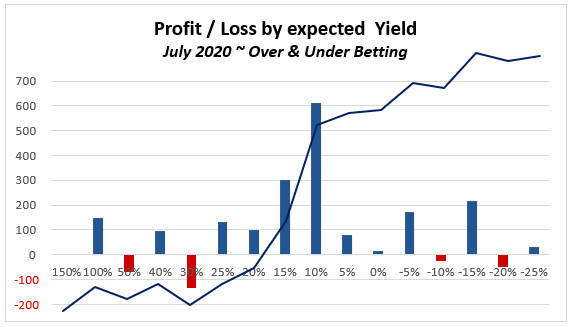
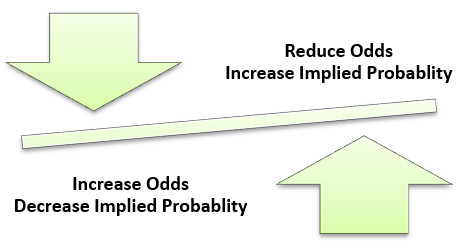
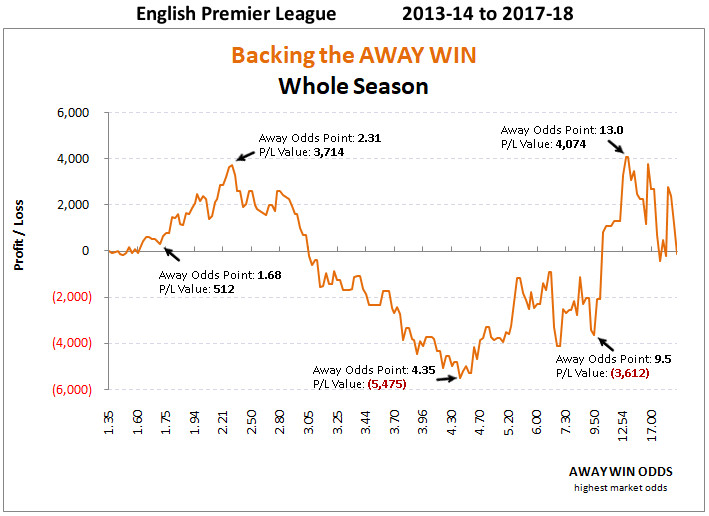

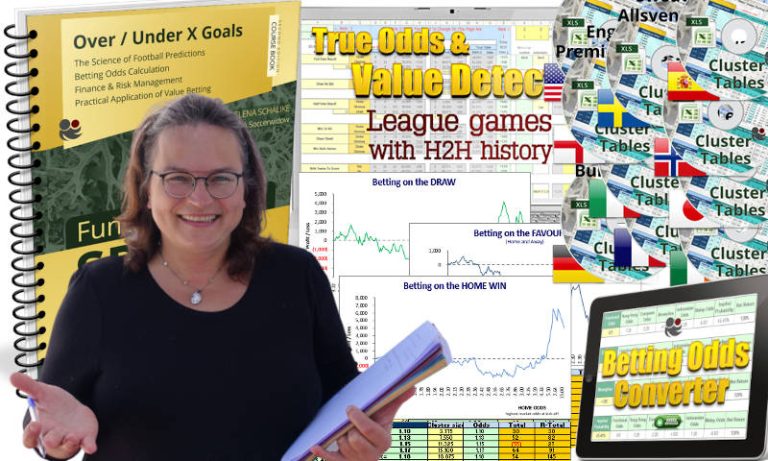
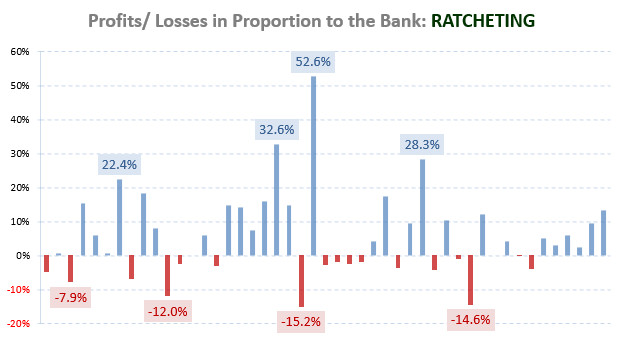

Hello Audiendi,
You can find value in any size of odds – it is not just limited to the longer underdog (or draw) odds. But beware, perennial betting on favourites is a sure fire way to long term bankruptcy.
The Value & Probability Calculator is certainly a good start for a beginner. It will enable you to analyse individual matches and find value in a large range of bet types.
Yes, it is a valid method for calculating probabilities, which you must do in order to find value.
The HDAFU Tables are also a sound method of betting unemotionally, without needing to know anything about the matches in question. It’s all based on maths and numbers.
The strongest advice we give to beginners is to master things on paper before committing money on a single bet. If you feel you want to rush in and start betting straight away, then you are not mentally ready to make money in the long run.
Consider also our Odds Calculation Course, which will teach you how to read and understand statistics, and use them for future forecasting. It’s an unique insight into how bookmakers set odds, and if you want to play them at their own game, you will need to know how they operate.
Good luck!
Right Winger,
Thank you!
Hey guys,
Firstly, I’m really impressed by your site and your diligent replies.
I’m wondering is it at all common to find overpriced short odds in the 1 x 2 market? Or is it only common for there to be ‘value’ with long odds?
I’m a beginner. But I want to start placing bets, the thing is I’m a bit scared by the prospect of betting with emotion or looking for upsets and then getting addicted to it. So I’m thinking of using a maths-based system and a more conservative low odds strategy with risk spread across heaps of such, single bets.
May I also ask, is your value calculator similar to the type that betting agencies use to calculate their estimations of probability (before adjusting their odds for the reasons you outlined)?
Hello Soccerwidow!
I would like to ask that if Bayern Munich playing at home, it’s odds is 1.2, what are professional bettors do before kickof?
They are trying the back high, and lay low or just simply they are waiting the odds to go out of fair odds range and simply lay them? If they are doing this, they shouls have big patient..
Thanks,
Hi sarkec, if you are referring to in-play betting then this question doesn’t have a simple answer because it really depends in which direction the odds are expected to move.
However, if you are into fixed odds betting, and say you have calculated a ‘fair odds’ range between 1.18 and 1.22, and find odds for Bayern Munich of 1.2, then either lay Bayern at 1.15 and hope that somebody will match them after kick off, or back them at 1.25 (or higher).
Hi all , I have a question I would like to be answered , I have in recent times delved into the world of tipping and my success rate is above average , my main sport I concentrate on is soccer, there is one area that continues to surprise me though and that is the odds of two teams prior to a match where clearly in all forms of understanding is totally out of place …………….. example team A] all the stats on this team are well below the opposing team …. by this I mean everything from recent form , position on the log , goals for and against ….. and so on …………. team B] as expected are well clear of team A ……… team A ]1.85 ….and team B]3.85 …………. now in the beginning I used to be shell shocked so I then went back to the info on the game and to any level of thinking there is no way on earth team A should be better than team B ………….. low and behold Team A wins ……. now this has continued but over time I have kept those games records and once I considered myself to have enough of them I went through the happenings of each and every game and it was to no surprise to find that there is something rather disturbing about them …… the one major occurrence that happens is the team that `should` have been favorites [team B] gets a red card during the course of the game …………. now the percentage of this fact is astounding …..86% ….believe me that is a monumental percentage considering the amount of games which to make you understand is a three figure number [ simplified …86 out of 100 games the `red`card ] ……. I have of course used this to my advantage and almost never went forward with this question here , …… just to let you know not one of those games were significant enough for either team should they have won or lost …………….. cheers Henry
In particular, if a very large bet is placed with one bookmaker, this may be signalled to the others as a way of lowering the price on all the boards. While this method of communication is used less frequently than before, many of the terms persist.
Whatever you bet, please don’t bet your tie and shirt cause you can’t beat these fat tummy bookies. These guys are guarded by the ghost point spread system. Whats your guard? fortune? probability? Luck? Chances? What?
So long as you bet they way betting is set out to be done then you cant make profit, these guys had make their own research to confirm that they cant lose. Thats why betting is open for any man to bet, even Albert Einstein had right to bet
Hi Leo,
What we are talking about is balancing the books in the ante post market – the period leading up to kick-off.
Bookmakers certainly do attempt to balance their books; otherwise they would not place bets of their own with other bookmakers, a practice which certainly does happen.
It happens in other industries too, for example the insurance market, where insurance companies lay off some of their potential liabilities by buying re-insurance. It’s normal practice and every insurer does this to some degree or another.
You will certainly struggle to make money backing favourites or lower priced events where the margins have to be protective for the bookmakers’ sakes. Where you will always find value is in the underdog market – enough underdogs win at HT and FT in many leagues worldwide to make handsome profits. The only problem for bettors is the psychology of playing longer odds and coping with longer losing streaks.
With homework, patience and persistence you can certainly make big yields, but those looking for more instant success are usually those who believe in getting rich quick, which is a fallacy when applied to betting of any nature.
Check out our 1×2 Home, Draw, Away, Favourites & Underdogs tables for a taste of what I mean. The supporting videos (due in the next day or so) are also very revealing.
Thanks for taking the trouble to write and best wishes.
A bookmaker doesn’t balance anything. Tommy is right. The problem is that even at best prices in the market, over the long-term an individual punter is still a loser. And by the way, Betfair is a joke! I rarely bet, but I test a lot and it is my belief that you can’t beat the market mathematically. The in-built margins are deadly.
As far as I understand it you get odds compilers that specialise in certain events like soccer, tennis, darts etc. They tend to be like a market maker attracting other bookmakers to advertise similar odds. They know how much money they want to attract to certain events depending on what they’ve made or lost over the year and they do their advertising with the odds. Too high and they get too much money creating too much risk, making them too low and they don’t get enough money. Due to this spread off odds it’s possible to spot profitable differences in the odds between different bookmakers. Which takes the betting out of the equation. Known as arbitrage betting.
I’ve never read such nonsense. I’m a trader for a rather big firm. The priority is not balancing the books whatsoever. Take the West Ham vs Man City game last week. When WH went a goal ahead early on, City went out to about 7/4 and gradually the price got bigger. The only bet 95% of customers were placing was on Man City to win. How on earth is a trader supposed to balance the books in that case.
An odds compilers job is to set market prices accurately with inbuilt margin. A bookie may lose on loads of games/races/markets. But over the course of a year with thousands of evernts, they know their inbuilt margin will make them a profit, as the ‘well backed’ selection will lose enough times for that.
Hi Tommy, thanks for your comment and valuable input.
What you say adds nicely to my latest article: Are Betting Odds Worthwhile Calculating? Are Betting Odds Always Fair?, especially as I explain there odds compiling for the so-called favorite Man City in their match against West Ham.
This match was an excellent example of a ‘well-backed’ and under-priced section of the books. However, in the article I have only shown that Man City was hugely under-priced before the match. Therefore, as you’re mentioning 7/4, after WH’s first goal, this was even more under-priced! Thanks for the insight!
By the way, we are planning an article series of interviews with people who work for the betting industry. Should you be interested to be the first, please get in touch with me: admin[at]soccerwidow[dot]com
About live betting, let’s say we calculated probabilities of 75% (odds 1.30) for a given match to have 3 goals or less pregame (Under 3.5); when the game begins there’s a goal within the first 5 minutes so the odds in this market increase to 2.10 or something like that, which is of course a fantastic price according to our calculated 75% of success; at this stage should I take advantage of this situation and place a bet in the Under 3.5 or should I stay away from such move?; I wonder if taking advantage of early goals can be implemented as a strategy related to pregame calculated probabilities; it is just an example but in fact this can be applied to any market depending on what’s happening during the match, but I’m not really sure if the concept of value betting extends beyond pre match calculations.
Yes jogomo, we have some clients who successfully use the calculations from our Value Bet Detector to identify value in the live betting market. Here an article on this subject submitted by a client: A Trader’s Point Of View
However, please always remember that whatever strategy you wish to employ, you need to study the market first including loads of paper exercises before committing any money. Once you find your strategy then stick to it, don’t experiment.
Thanks once again for your interest in Soccerwidow.
We do have a product for Champions League and Europa League matches – see our site at the following link:
https://www.soccerwidow.com/betting-maths/true-odds-value-detector-international-club-competitions-with-no-head-to-head-history/
So far as ‘live odds’ are concerned, the odds at bookmakers change all the time according to how balanced their books are – there is no formula which a bettor can use for this – it purely depends on how much money the bookmaker has taken on an outcome and how he wishes to offset his risk through price fluctuations as the match progresses.
Betting exchanges such as Betfair are to some extent led by the bookmaker prices but as far as knowing what the price effects on a goal being scored by one team or the other, this is pure trial and error, and is different for every game. There simply is no way to calculate by how much the odds will change and I can only suggest observing and recording fluctuation patterns before ever committing money to an in-play bet.
I hope this helps and thanks for your question.
Can you please explain to me how bookmakers calculate odds for champion league or European league?
Which data are using and what quantity of data because there is not many mutual meetings (H2 history)?
Also I want to know how calculate live odds? Which formula are using for calculating?
I hope that you will answer to me soon.
If we have a situation where a bookmaker is deliberately moving his odds away from the norm in order to make the amount of money bet on each team lopsided. Then this particular bookmaker is not trying to balance their books but rather is having a bet themselves with the bookmakers’ margin still on their side.
Unfortunately, it is impossible to work out the actual true probability of a team winning; if we could, then we would be amazingly rich! But we can always attempt to approximate it.
Bookies are accountants who manipulate the odds so they can relieve you of your money!
Odds compilers know that many fans will blindly bet with their own team no matter what. In a derby match the home team is usually favourite 4/6-6/4 and the away side can be 2/1-3/1 and the draw will be 12/5. So essentially the fans of the opposing sides will cover each others bets. Add in all the people that put on 1st goalscorer correct score bets (even harder to get) and they would struggle to lose money.
Some bookies even have a team of specialist odds compilers that enable you to make almost any bet (my 4 year old son to play for England/Scotland 500/1), If you ask for odds of you climbing Everest they will look at your fitness, experience, percentage of summit attempts that succeed and give you odds.